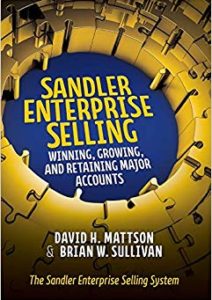In port cities, we see the massive mooring lines that securely tie huge ships to the docks. Getting those ropes down to the piers from the giant vessels was a problem that inventive sailors solved long ago by wrapping the roping around itself at the ends, creating what looked like monkey’s paws. These were heaved from the ships to the dockhands below, who caught and safely secured them. Something small, therefore, secured something big. Sandler Training’s founder, David Sandler, related the concept to selling, helping countless sales reps win business by proposing smaller pieces of larger deals to prompt prospects to act – monkey’s paws.
They’re especially helpful when the cost or scope of a deal might be intimidating but something smaller gets things moving. Or when the validation of a proposed solution’s effectiveness eases a prospect’s anxiety.
Given the complications of major account solutions, enterprise monkey’s paws can become rather complex. Pilot projects allay prospects’ fears, proving a proposal’s effectiveness through implementing a portion of the solution. Prototypes simulate full solutions, often with reusable elements. Trials are employed as small-scale initiatives, testing solutions and weeding out flaws prior to full implementations. Proofs-of-Concept (POC’s) preview larger solutions through smaller, limited time exercises, breeding insights into the provider’s delivery capability. And Minimum Viable Products (MVP’s) are no-frills implementations, impacting only minimal functionality while creating value, sparking user engagement, and generating valuable insights. There are certainly other ways to “test drive” in the enterprise world and of course, we also see similar introductory vehicles in selling to small and medium-sized businesses. I grew up in selling at Xerox and we frequently utilized demonstrations, a practice quite popular today in the software space.
There’s no question that today’s variations of monkey’s paws can help win and close business. And if enterprise deals truly depend on “Prove it or Lose it”, these vehicles often provide the required verification, sealing the victories.
All that said, “Beware the Monkey’s Paw!”.
But why? Think about it. Betting on introductory engagements, regardless of structure, presents a minefield of risk. When you begin such initiatives, you can be assured that all the prospect’s team members are keenly aware that their commitment to you is temporary, whether or not you’re being paid. From the execs to the actual users, their connections to you in this awkward time are much softer than if you had secured the full business. Their accessibility, support, and guidance all come at arm’s length. And given that the ultimate prize remains in doubt, your contacts who favor a competitor might not directly sabotage your efforts but will likely be less than helpful, while confidentially keeping their preferred partner well informed.
And with your team laboring to prove value, you’ll be judged in the spotlight’s glare. Your every action will be tracked, with mistakes tallied by the likely hovering presence of contracts and legal team members. These high stakes, of course, mean high costs. Again, whether billable or not, monkey’s paws almost always bring significant expense. For your superhuman efforts to overdeliver to ensure the transition to the big win will likely dictate overspending in finances, effort and time. And since you logically assigned your “A” Team to this critical initiative, the debt will have to be paid. As the faucets of expense flow, so will the opportunity costs.
The monkey’s paw minefield also presents the crippling danger of free consulting. Showing your creativity and ideas in your efforts to impress often exposes too much. Seemingly successful initiatives can end with smarter clients positioned to forge ahead by following the path you outlined. On their own, without you. Or worse, partnered with a competitor. Or maybe you performed so flawlessly that the client wants to award you the big deal but at a reduced price. Beware, indeed.
So, how should you proceed? First, be certain that your preparation is comprehensive and that you follow an effective process in building your solution. Your Go/No-Go decision must verify that both the account and the opportunity are right for you, unquestionably fitting your profile. Then, when accounts demand pilots, trials or POC’s after requesting proposals for full engagements, make every effort to stand your ground. If some type of initial engagement must be delivered for legitimate reasons like the timing of funding or required verification, proceed with caution and only after gaining contractual agreement on the risky initiative’s clearly-defined endpoint. And only after making the reasoned business case for proceeding in full partnership from the outset, exuding confidence in your total solution. And only if you absolutely must. Be realistic, of course, but don’t do your organization or your solution a disservice. For, in the end, your work has earned the right to win the full business you’ve bid on.





Comments